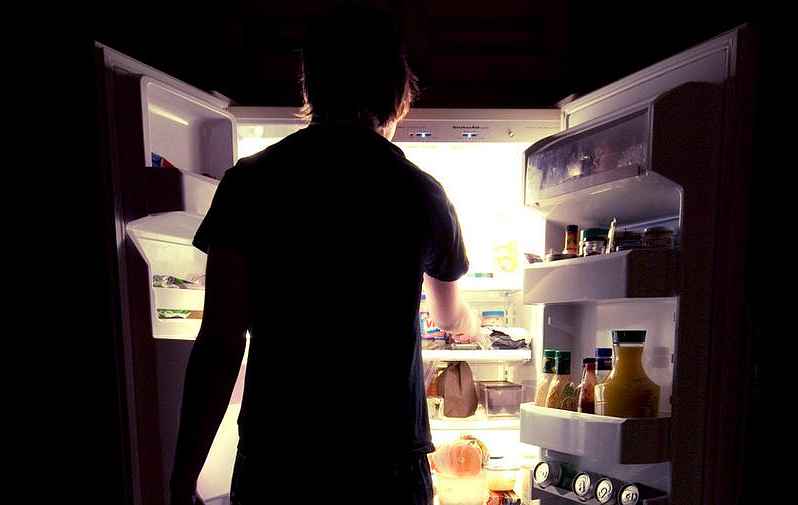






See listing of Recent and Most Popular articles on the Home Page
Health & Wellness
Category: Health & Wellness / Topics: Advice, Guidance & Mentoring • Optimal Aging • Wellness
Sleep and What You Eat
Posted: December 17, 2021
The best and worst foods to eat before bed…
Editor's Note: Have troublih getting to sleep? What (and when) do you eat before going to bed? The following article by Aiden Wynn appeared on Stylist in May 2021. We found it on the Pocket feature of our Firefox browser.
There are a number of different factors in your day-to-day life that can make it difficult to get to sleep, from stress to our central heating. People are reporting sleep disturbances more than ever: the average person is losing two hours of sleep a night and 37% of people in Britain are sleep deprived, according to 2021 research from fitness tech brand Zepp.
But what if we told you that the answer could lie in something much more simple than lavender sprays and supplements? When it comes to getting a good night’s sleep, your diet can play a huge role. Studies, including a 2016 paper from Columbia University, have found that our dietary patterns and consumption of specific foods can have a significant impact on our sleep quality, with some foods having the potential to really disrupt our time snoozing.
Certified Health Education Specialist Brielle Merchant and Dr Aishah Iqbal both know just how important sleep is, and how much our eating habits can affect it. So we asked them for their expert insights into the link between diet and sleep, what you can eat to ensure you sleep well – and what foods are most likely to disrupt your rest.
How Important Is Diet to Good Sleeping Habits?
As Brielle explains, “eating well balanced meals supports your body’s pathways when regulating your hormones”, some of which “impact how much sleep you get and how well you sleep”. This means that eating foods containing nutrients that support sleep – and in the right amounts – is crucial to ensuring you are able to drift off when your head hits the pillow.
It works the other way too, with your sleep impacting your food choices. Both of these factors can influence your energy levels throughout the day. So, Brielle recommends “trying to keep a consistent sleeping and eating pattern, so that they are able to work together to supply your body with energy”.
When and How Much Should You Eat in the Evening?
Dr Iqbal explains that “there is growing evidence to suggest that the time you eat can impact your circadian rhythm”, also known as your sleep-wake cycle. As a result, eating too close to when you go to bed can potentially impact your sleep routine, and so “it’s best to eat earlier in the evening, allowing yourself a couple of hours to digest your meal before going to sleep”.
However, there is no hard and fast rule for when you should be eating. As Brielle explains, “it’s important to listen to your body and how you feel, so aim to feel satisfied when you eat in the evening, but not stuffed or hungry. It all depends on what works well for you”.
What Are Some of the Worst Foods to Eat Before You Sleep?
Some ingredients may not always be a good idea to eat close to bedtime due to their energising nature. Both Brielle and Dr Iqbal particularly warn against the consumption of caffeine too late in the day, “because it stimulates the brain and gives you energy, thus keeping you awake”, says Brielle.
Foods high in sugar can also be stimulating for the body and mind. As Dr Iqbal explains, they “heighten arousal and give you a dopamine hit, which keeps you feeling alert”.
According to Brielle, some foods cause disrupted sleep simply because they take longer for the body to digest. If you’re struggling with your sleep, try to stay away from heavy proteins in your evening meals, and minimise the high-fat foods which require longer to be broken down.
What Foods Will Help You Get a Good Night’s Sleep?
Brielle explains that kiwis are excellent sleep aids. In fact, “in a study, participants who started consuming kiwis regularly before bed were able to fall asleep 42% faster” than they did before. Foods high in melatonin are great as well, because melatonin is the hormone that helps to regulate your circadian rhythm. Dr Iqbal recommends cherries and nuts such as walnuts and almonds as good sources of this crucial hormone.
Fatty fish such as salmon and tuna are a good option for your evening meal. They are a great source of vitamin D and omega 3 fatty acids, “which help to regulate serotonin, the hormone that is responsible for maintaining sleep”, explains Brielle. Milk contains vitamin D, too, as well as tryptophan, “both of which have been linked to supporting sleep”.
Other minerals, such as magnesium, have also been shown to support your sleep cycle and send you into a deep sleep. Foods such as spinach, nuts, salmon and banana are high in the mineral and great to be included throughout your day to maintain levels.
Search all articles by Aiden Wynn
Posted: December 17, 2021 Accessed 223 times
![]() Go to the list of most recent Health & Wellness Articles
Go to the list of most recent Health & Wellness Articles
![]() Search Health & Wellness (You can expand the search to the entire site)
Search Health & Wellness (You can expand the search to the entire site)
![]() Go to the list of Most Recent and Most Popular Articles across the site (Home Page)
Go to the list of Most Recent and Most Popular Articles across the site (Home Page)
 Loading requested view...
Loading requested view...